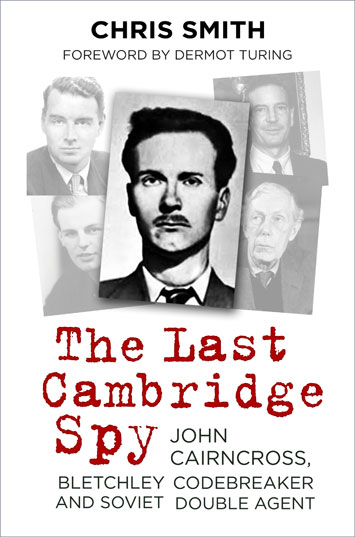The Last Cambridge Spy by Chris Smith – Review

By Karl Hornsey
Since the exposure and defection of Donald Maclean and Guy Burgess in 1951, there has been a fascination about the lives of the ‘Cambridge Spies’ that continues to endure to this day, and is likely to continue for many more decades to come. The simple reason for this is that it’s a hugely interesting, not to mention controversial, subject that features so many different facets, cutting across class and political leanings, and involves pretty much every aspect of the British Establishment.
To add to the extensive canon of books already written about Maclean, Burgess, Anthony Blunt and Kim Philby, comes this first-ever biography of John Cairncross, widely regarded as the fifth member of The Cambridge Five. Chris Smith, Lecturer in History at Coventry University and author of The Hidden History of Bletchley Park, has attempted to reveal more about how Cairncross’s upbringing eventually led to him taking his place in such a pivotal moment in British history.
 Perhaps befitting of a man who led a secret life for so long and who lurked in the shadows, leaving those around him oblivious as to his true identity, very little has been known about Cairncross. Until now. In fact, in recent times, the most prominence he has achieved has been in The Imitation Game, a film that mixed fact and fiction and focused on the work of Alan Turing at Bletchley Park, including a tenuous subplot involving Cairncross, even though it’s pretty much a given that he and Turing never actually met.
Perhaps befitting of a man who led a secret life for so long and who lurked in the shadows, leaving those around him oblivious as to his true identity, very little has been known about Cairncross. Until now. In fact, in recent times, the most prominence he has achieved has been in The Imitation Game, a film that mixed fact and fiction and focused on the work of Alan Turing at Bletchley Park, including a tenuous subplot involving Cairncross, even though it’s pretty much a given that he and Turing never actually met.
“A valuable work”
But, back to The Last Cambridge Spy, and Smith rights a wrong that has left Cairncross somewhat disregarded, despite him being one of the most damaging and influential spies of the 20th century. Given Smith’s background it’s not surprising that this work takes on something of an academic nature, and the author does have to battle with a couple of problems. First, that the level of interaction between Cairncross and the rest of the Cambridge Spies was much less than it was between the others, leaving him a little isolated and on the periphery.
But second, and perhaps most importantly, that Cairncross simply lacked the obvious charisma, magnetism and character that certainly Burgess and Philby had in spades, which makes them to this day such fascinating subjects. Cairncross comes across as much more straightlaced and less colourful, rather than as someone who passed on thousands of classified documents to the Soviets, including those that highlighted the progression of plans to develop atomic weaponry.
Despite that lack of charisma, this is still a valuable work for anyone with even a passing interest in the subject or the time. The ease with which Cairncross managed to assuage any doubts as to his secret life for so many years would be comical if it weren’t so serious, even in his later years as he tried to downplay the impact of his actions. Smith also goes into plenty of depth about his interesting later life as a translator and writer, making this by far the most detailed and insightful profile of a man who spent most of his life trying to avoid the spotlight.
‘The Last Cambridge Spy: John Cairncross, Bletchley Codebreaker and Soviet Double Agent’ by Chris Smith is published by The History Press









